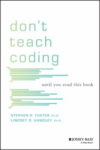 I have always loved reading for pleasure. And for the most part, I love all the books I read. That’s because I don’t read books I don’t like. I have two—and only two—rules for reading:
I have always loved reading for pleasure. And for the most part, I love all the books I read. That’s because I don’t read books I don’t like. I have two—and only two—rules for reading:
- Outside of an English class, you don’t have to read a book just because someone says it’s good. (There may be a better book out there.)
- You don’t have to finish a book just because you started reading it.
I do recommend, however, that you keep a list of books you started but never got around to. That includes those that you checked out of the library but could never get around to opening. There’s a reason you decided to check it out, but there’s also a reason you never got around to reading it.
I’ve always believed in the value of rereading books. I have a list that I make it a point to reread every once in a while because if it’s been a few years since I’ve read one of them, I am now a different person. I’ve been shaped by the experiences I’ve had since I read them (including reading other books in the meantime). Reading a book is really a conversation between who you are now and who the author was when they were writing the book. They haven’t moved on since then, but hopefully we have. We’ll end up getting different things out of it this time around.
In that spirit, here is a list of the books that I started reading in 2023 but just couldn’t bring myself to finish.
The Salt Grows Heavy
I so wanted to like this book. From the blurb on the inside dust jacket to the utterly entrancing book cover, everything about this book said I would probably enjoy it.
Here’s a bit of that blurb:
You may think you know how the fairy tale goes: a mermaid comes to shore and weds the prince. But what the fables forget is that mermaids have teeth. And now, her daughters have devoured the kingdom and burned it to ashes.
I have a love for fairy and folk tales and mythology. In short, I love origin stories. So everything said this would be the book for me. It was not.
My first clue was in the second paragraph:
I pause. In the penumbra, the fading dusk gorgeted by coral and gold, you could be forgiven for mistaking the ruined house a ribcage, the roof its tent of ragged skin.
That’s an arresting image in my mind’s eye, to be sure. But what the hell does it mean to be gorgeted?
In this one line, we see Khaw’s two flaws as a writer, both of which could be fixed by a more attentive editor. First, Khaw likes to throw in a lot of very obscure words. I’m no slouch on the vocabulary front, but I do believe that an author writing in English should make an effort to write in fairly understandable English (yes, even you, James Joyce). If I have to run to my dictionary just to figure out what a word means so I can figure out what the sentence it is in means, then my sense of the story is disturbed. I am constantly being pulled out of the then and there of the story to the here and now of the dictionary (or a dictionary app). This is the exact opposite of what a good writer should do: draw you into a story so fully that you are reluctant to leave.
A gorget, as it turns out, is simply an article of clothing that goes around the neck. And here we see the author’s second second flaw: Khaw likes to use nouns as verbs and verbs as nouns despite the fact that perfectly suitable words already exist. “Pine trees and white spruce scrape at the firmament, skeining the snow in strange patterns.” What? What does this even mean?
Later on (page 10, actually) meat is seasoned with “some dried thyme, some basil crushed under a jag of rock, a rich spill of peppercorns…” If there is something here that I am supposed to notice about those peppercorns, I have failed to do so.
It is clear that Khaw is in love with language, with the feel of words as they spill over your tongue. When she gets it right, it’s a beautiful thing:
The physiology of my species is protean, unmetered by logic. When we breed with angels, our children accrete feathers. When we lay with hurricanes, we birth storms, wind-spirits with the voices of dead sailors. A thousand mythologies contributed to my conception. Who can say which of them was responsible for this miracle?
That’s heady stuff, and I absolutely love it. Like I said, when she gets it right, it’s beautiful. But an editor should have caught the stuff her creative writing professor apparently couldn’t get her to curtail. There are just too many words that don’t need to be here. Here’s another example:
“Was this yours?” says the plague doctor, and they gesture with a hand, the graceful parabola of the motion encompassing the room at large.
The doctor waved at the room, okay? You can say he gracefully waved if you want, but really, this is too many words for such a simple gesture. And the fact that parabolas come back to the level they originated from makes me wonder what the doctor was actually doing with his hand. Khaw sometimes seems either to be unaware of the meanings of words such as cannibalized or to be trying to twist them into meanings they don’t actually have.
Given that this is such a short book (it’s 97 pages; the dustjacket rightly describes it as a novella), this really feels like fluff, meant to plump it up and make it longer than it needs to be. I got to page 43 and had had enough.
There is a wonderful story somewhere in this mulligatawny soup of excess words, but I don’t have the patience to winnow it out. But I will leave you with another example of Khaw being absolutely delightful, most notably because she doesn’t have to bend words to the point of breaking them:
I glance over as he unwraps whatever he’d excised from the dead boy’s viscera: a bolus of broken-off teeth and snarled hairs, fingernails, caked dirt, curds of mummified grey, colored glass. Over it all, a lettering of fine blue veins, like an alphabet that only muscle can decode. It throbs in his grip, alive. He smiles at the bezoar before bellowing.
Heady stuff indeed.
Don’t Teach Coding Until You Read This Book
 by Stephen R. Foster and Lindsey D. Handley
by Stephen R. Foster and Lindsey D. Handley
At one point, I could have been a computer teacher. I have a teaching certificate in both science and English and Michigan state law doesn’t really lay out any requirements for teaching computers. It just says that the person teaching it has to be highly qualified, which I am.
That said, I’ve seen too many computer classes that are little more than “how to pick a cool font in Microsoft Word”. That is all what happens when you don’t have a curriculum that’s underpinned by sound pedagogical principles, which is all too often, in my experience. In fact, in the introduction, under the heading “Who Is This Book For?”, the authors state
Mainly, this book is for K-12 teachers of coding, or any educated adult with an interest in the teaching and learning of programming languages.…This is because, increasingly often in the coming years, teachers who once taught a different subject will find themselves suddenly teaching coding. So we wanted this book to be of use to teachers in those situations.
Which is good, and which is what I hoped this book would be. Unfortunately, it is not. I managed to make it through the first chapter and a big chunk of the second chapter, which are mostly devoted to linguistics: syntax and semantics.
Both of which are important things. After all, programming languages are languages. But if the authors have a point to make, they sure do take their time to make it. 60 pages in and I still don’t know why I should read this book before I teach a coding class. Look, K-12 teachers (the presumed audience for this book) are busy people. If you have something to say to them, then get to the point and say it. But the authors don’t do that.
Instead each section is preceded by a Harry Potter-style prologue about students being sorted into different houses, each corresponding to a different programming language, at a magical coding boarding school run by an ancient wizard. They don’t say it’s a take-off on the Harry Potter books, but when the three students are Henry, Rob, and Harmony, the reference is all too clear. Listen, if your point is that it’s more important to understand how a language (whether programming, verbal, or visual) is put together before you try to understand actual coding, then just say that. Look at that: I just said in one sentence what the authors spend pages to say, and never actually get around to just saying it.
Unfortunately, this book is largely the product of authors who are more in love with the sound of their own voice and their literary references than actually being in any way concise or useful. The first 60 pages contain probably ten pages of actually useful information. I don’t have the time to read the other 204 pages if they also contain this much fluff.
Ironically, the book’s prologue includes a link to their forums. I followed the link, expecting to find at least a mildly active forum. After all, if you think you know coding well enough to tell others how to teach it, setting up and running an online forum should be a slam-dunk for you. Instead, there is no forum. The link redirects to their Facebook which has—wait for it—three members. As of this writing, it has no new posts in the last month and no new members in the last week.
(Also, maddeningly, the entire book is set in the sans-serif font Ubuntu. For a book that is supposedly research based, you think the publisher would know that books should be set in a serif, not sans-serif, font. But this is obviously a marketing ploy. “Book on computers? Better grab the sans-serif font so nerds will recognize it.”)
Back on the shelf it goes.
Works Cited
Foster, Stephen R., and Lindsey D. Handley. Don't Teach Coding Until You Read This Book. Hoboken, NJ: Jossey-Bass/John Wiley & Sons, 2020. Book.
Khaw, Cassandra. The Salt Grows Heavy. New York: Tor Publishing Group, 2023. Book.
https://bookblog.kjodle.net/2024/01/01/2023-book-fails/


Have you read A God of Small Things? : )
I have not. Should I? I don’t think any of my friends have read it yet.